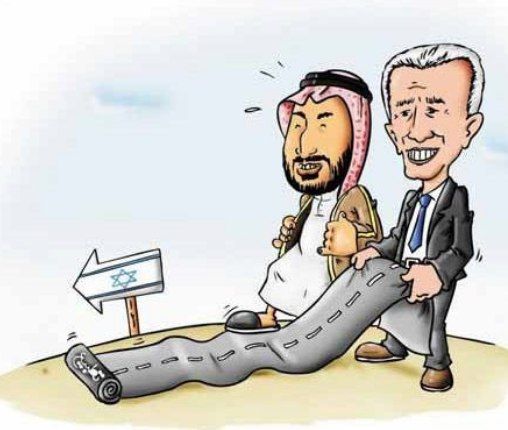Israeli airlines start flying over Saudi Arabia

Israeli airlines began submitting requests to overfly Saudi Arabia this week to consolidate the public normalization understandings that took place recently with American mediation between the Kingdom and Tel Aviv.
Israeli Prime Minister Yair Lapid stated that the flights that will pass Saudi airspace would save a lot of money and time.
Lapid stated, “On Friday, we bid farewell to US President Joe Biden, after a historic visit that achieved political, security and economic achievements that would strengthen the State of Israel for many years.”
He continued, “starting with the flights that will pass over the Kingdom of Saudi Arabia and save Israel’s citizens a lot of money and time, and ending with the Jerusalem Declaration, which guarantees the qualitative advantage of the Israeli security services.”
Israel Times reported that the Israeli companies El Al and Arkia had changed the flight path to destinations in East Asia to shorten flight times.
Channel 13 News reported that El Al and Arkia had requested to reroute flights scheduled for this week to destinations in the Far East, such as Bangkok in Thailand and the Indian city of Goa, which would reduce flight times by up to three hours.
Last Friday, Saudi Arabia announced opening its airspace to all civilian aircraft, in a move widely seen as part of a US-brokered effort to advance normalization steps between Tel Aviv and Riyadh.
The move occurred during US President Joe Biden’s visit to Israel and hours before he travelled to Jeddah, where he met Saudi and Arab leaders.
Biden described the flight decision by Riyadh as “the first concrete step on the path to what I hope will eventually be a broader normalization of relations between Israel and Saudi Arabia.”
The opening of Saudi airspace will allow a direct flight of 15 and a half hours to Melbourne, in Australia, and a 6-hour flight to the Maldives, if airlines decide to operate such routes.
The Financial Times highlighted that Crown Prince Mohammed bin Salman had previously told the American media that “the Israelis deserve their land.”
The newspaper pointed out that this position of bin Salman contradicts the constant assertion of Saudi officials that normalization with Israel will not be possible unless it resolves its conflict with the Palestinians.
Riyadh, which engineered the 2002 initiative that promised normalization with Israel in exchange for a Palestinian state, says it adheres to this position, but this is in contrast to privileged positions.
By comparing Saudi Arabia to the prospective bride, a source familiar with the thinking of the royal court told the American newspaper that the Kingdom would need a meaningful gesture.
“You have to apply with a diamond wedding ring, which is an essential step forward in the Palestine cause,” he added.
But the courtship appears to be gaining momentum, as both Israel and Saudi Arabia have expressed interest in better relations.
Biden exited his visit to Israel and the Kingdom with an agreement between Israel, Egypt and Saudi Arabia regarding the presence of multinational forces on two islands in the Red Sea that Cairo transferred to Riyadh in 2017.
A Western diplomat said that the Kingdom is also expected to deepen its secret exchange of intelligence information and its security relations with Israel while facing their common enemy Iran.
According to the newspaper, Tehran supported the Houthi rebels in Yemen who attacked facilities in the Kingdom while fighting against the Saudi-led military intervention. MBS has gone so far as to describe Israel as a “potential ally”.
Even the change in dialect in Saudi Arabia, once famous for its ultra-conservative brand of Islam and fiercely anti-Semitic textbooks, has been carried over to Saudi television.
In one presentation, a Saudi man said his country should make peace with Israel while calling Palestinians ingratitude.
Some Saudi influencers regularly extol the benefits of peace with Israel on social media, which authorities closely monitor.
A decade or two ago, mention of normalization with Israel aroused suspicion, if not outright hostility, from the Saudis. That has changed, especially with the prevailing perception that Iran has long since replaced Israel as its enemy.





